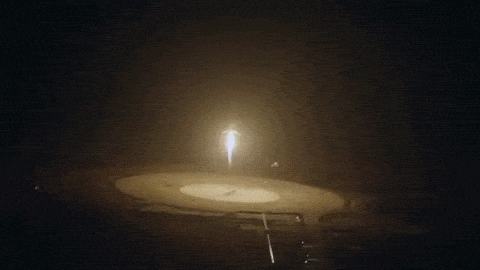Blue Origin, the space-tourism company owned by Amazon founder Jeff Bezos, performed another successful test of their reusable rocket New Shepard this weekend on April 2. This is the third time that the New Shepard has been launched and safely landed, a huge accomplishment towards making space travel affordable and cost-effective.
The same rocket used this weekend was also successfully launched and landed in November and January. This latest test flight of Blue Origin’s suborbital rocket carried a capsule capable of carrying 6 passengers, and for a company planning to begin ferrying tourists into space as early as 2018, this launch could not have gone better.
[youtube https://www.youtube.com/watch?v=YU3J-jKb75g]
Both the rocket and the capsule were retrieved safely after launching over 100 km, the commonly held boundary between Earth’s atmosphere and outer space. . The capsule was lowered back to Earth by parachute, but the booster waited until it was only a little above 1,000 m above the ground before reactivating its engines. With only six seconds before impact, the booster rocket was able to have a successful vertical landing.

Tests like these are the key to making space travel affordable. Only recently has the concept of reusable rockets been able to become a reality. One of the greatest costs of space flight is that the rockets used to send their payload into space have only use. Blue Origin aims to make space flight affordable – and profitable – by cutting the cost of these single-use rockets.
As Bezos says, “We’re still building these big rockets, we use them one time and then throw them away, that drives the cost up so much.”
However Bezos’s Blue Origin is not the only name in commercial space flight or reusable rockets. Fellow billionaire entrepreneur Elon Musk has his own company SpaceX that landed the first stage of its Falcon 9 rocket in December in Cape Canaveral after a few failed attempts earlier to land the rocket on a barge in the Atlantic.

Musk was quick to point out the differences between SpaceX and Blue Origin. Blue Origin is currently only building suborbital rockets that reach into space but do not have the speed to achieve orbit. SpaceX on the other hand has been successfully launching orbital rockets for some time, though only recently having a section of one successfully land itself.
If you’re looking for more information regarding the distinction between space and orbit, Musk himself tweeted a humorous link after the first launch and landing of the New Shepard in November.
It is, however, important to clear up the difference between “space” and “orbit”, as described well by https://t.co/7PD42m37fZ
— Elon Musk (@elonmusk) November 24, 2015
As of now, SpaceX has no plans to reuse the safely landed portion of its Falcon 9 rocket. Blue Origins however is already planning a fourth launch for the same rocket. Landing a rocket is an important step towards rocket reusability, but in order to make space flight truly affordable, the launch provider must be able to safely relaunch recovered rockets. With their latest launch, Blue Origin has successfully reused the same rocket twice.

Hawthorne’s marketing side must be doing quite well to make someone mix up the headline like this — absolutely laughed out loud to see it begin with “SpaceX’s Blue Origin”!
Truly SpaceX deserves much credit in the world of reusable rockets. But perhaps not direct credit for the successes of Jeff’s company.
(If there is an editor in the room, the headline should instead read “Blue Origin Relaunches and Lands New Shepard Rocket for a Third Time”
Poor Journalism …. bad homework… screwed up that Heading
What a crazy title, “SpaceX’s Blue Origin…”